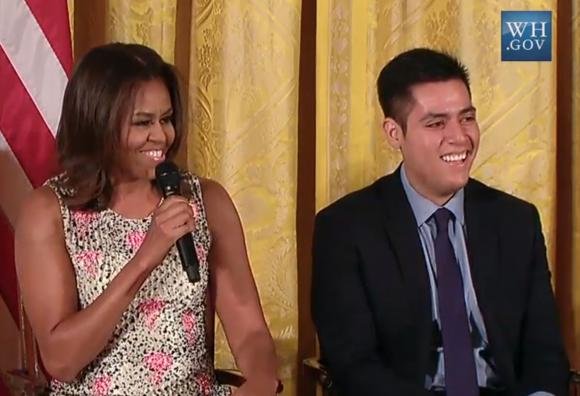PROVIDENCE, R.I. [Brown University] — When he arrived at Brown three years ago, Manuel Contreras found himself in more than strange surroundings. He felt as if he had stepped into an entirely different world.
His early experiences and his conversations with peers started him on a productive and passionate path toward helping first-generation college students with their entry into the often intimidating world of higher education. He became a co-founder of 1vyG, an organization that builds supportive communities and advocates for change.
On Thursday, that productive path led Contreras to the White House, where he joined a panel with First Lady Michelle Obama, Education Secretary Arne Duncan, and musical artist Wale, moderated by Terrence Jenkins of E! News.
The audience included more than 130 college-bound students whose entry into higher education once seemed a remote prospect — foster, homeless, rural, urban, special needs, and other under-represented youth. The panel was part of a day-long “Beating the Odds Summit” at the White House; the mood was celebratory but seriously helpful.
Contreras described his own entry into Brown — the excitement, the challenge, the realization of a dream. And the sudden crash of reality. His parents, immigrants from Mexico, believed education would be the key to a full and better life. “But,” Contreras told the audience, “I'd never thought about what happens after you arrive on campus.”
He described feelings of self-doubt, of being under-prepared, of growing sadness, of not belonging in the world of elite higher education, yet feeling a pressure to succeed. Worse, when he went home for winter break, he began to sense that he no longer fit into that earlier world either. The sadness worsened in the spring.
“I felt surprisingly out of place — I had worked hard to get there, but so many of my classmates came from wealthy families, were better-read, and seemed more prepared. And at a few points, I felt like I didn't actually deserve to be at Brown,” Contreras said earlier in a White House e-newsletter. “Fast forward a couple of years, and I'm now a rising senior, ready to get my diploma. Because I was able to connect with other people who had shared my experience and gotten through it, as well as professors and advisers who went out of their way to help me, I've learned how to feel comfortable in the uncertainty.”
Contreras dates his breakthrough to a significant conversation he had in the basement of the Sciences Library — “a fab place to be sad.” A fellow student had asked about his apparent sadness, and Contreras was able to open up and talk about his experience. “I told him things I hadn’t even told myself.” The conversation led to a conviction that he really did belong at Brown, a validation that animated his interest in developing useful and appropriate supports for first-generation students. A Group Independent Study Project followed, and a Social Innovation Fellowship at the Swearer Center, and, earlier this year, a conference for first-generation students held at Brown.
The experience Contreras described struck some familiar chords in the room. First Lady Michelle Obama told the audience about her own entry into college and the difficulties of adapting to college life and a new culture. Her advice: Reach out on your own. If you need help, if you are falling behind, talk to someone, ask for help — and do not wait until the end of the quarter or semester. “You cannot do this alone, and you aren’t supposed to do this alone.”
Wale talked about the imperative to “become your own boss.” High school had rules and regimentation, bells to mark class times and give order to the day. College, he said, was when the training wheels came off. Mastering that new freedom and asserting control was crucial: “You’ve gotta want it.”
The advice — keep moving forward, pick yourself up after failures, ask for help quickly if you need it, ignore the doubters — was delivered with congratulation and encouragement. “Higher education is the key to everything you’re going to do,” Obama told the college-bound students. “[College] should be the coolest thing to do in life.”

